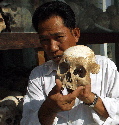PHNOM PENH, Cambodia -- Shortly after Vietnamese tanks rumbled across Cambodia's border in late 1978 the Khmer Rouge elite fled the capital and a new regime first attempted what the United Nations is poised to try again more than a quarter of a century later -- account for the grisly deaths of up to two million people. Pol Pot and perhaps his closest friend from their university days in France, Ieng Sary, were long ago sentenced to death in absentia for genocide, in a trial widely regarded as a legal farce. It was so badly handled and wrapped-up in Cold War politics that it escaped the attention of the outside world and for only a handful of people it remains a distant and inconvenient memory. In the wake of the Vietnam War, the West and Washington in particular preferred to recognize Pol Pot as head of state, and despite the atrocities committed by the hard line cadre that surrounded Brother Number One, Hanoi's occupation of Cambodia was deemed illegal and their Soviet-backed effort to deliver justice for the dead was damned as a rigged show trial.
27 Years On, Another Khmer Rouge Tribunal

